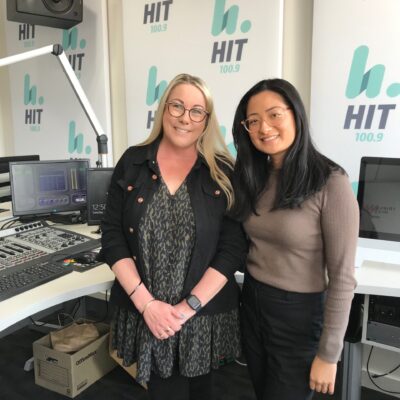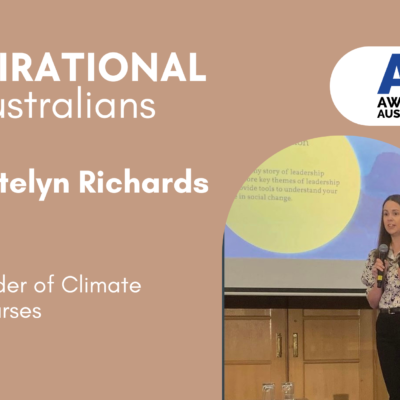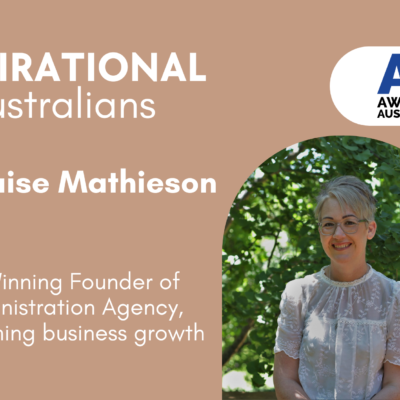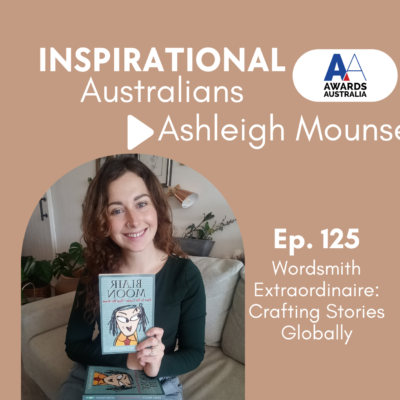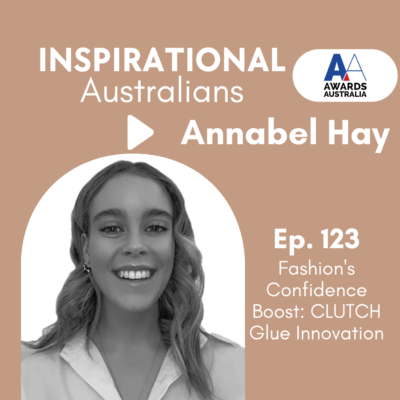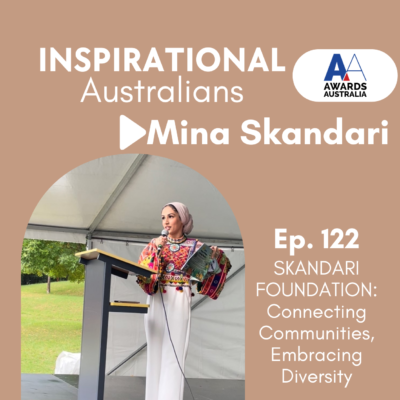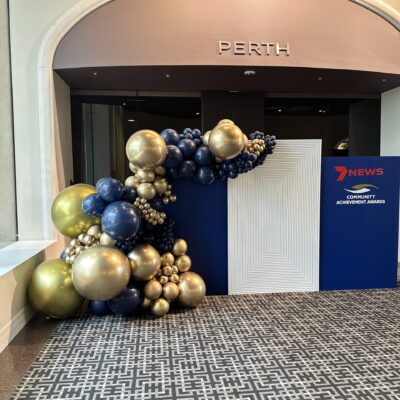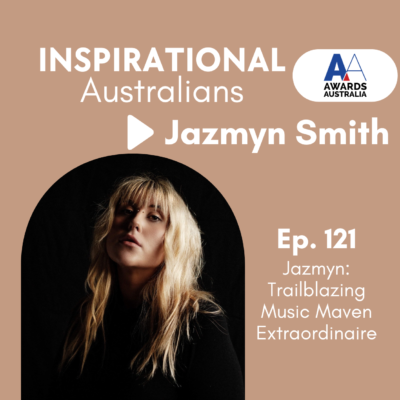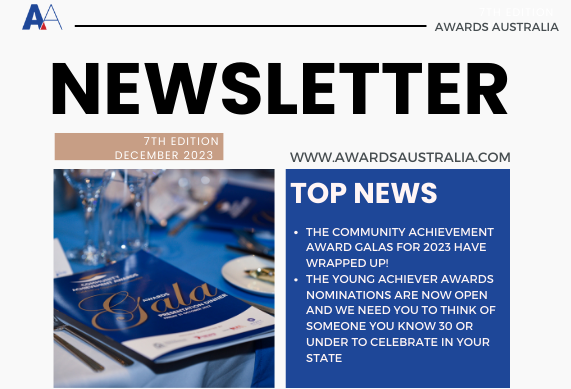In this week’s episode, Geoff is talking to Dr. Anika Molesworth who was a Winner in the 2018 NSW/ACT Regional Achievement and Community Awards.
Anika Molesworth has developed creative and critical perspectives on sustainability, focusing her work on innovative ways of enhancing agriculture for the long term. She is a founding member of Farmers for Climate Action and creator of Climate Wise Agriculture, a knowledge sharing platform connecting science research to farmers. Anika also founded and manages INTO Sustainable Farms, a program of the International National Trust Organisation which operates in 70 countries, promoting the conservation and preservation of natural resources, heritage breeds and heirloom species as well as the use of traditional farming practices. Anika is also a highly sought-after keynote speaker and educator.
In this episode:
- Anika talks about her passion for the land and how she believes that collaborations from around the world will manage climate change and bolster food security.
- Hear how Anika likes to talk about her ideas with her kelpie and how she transforms boring scientific articles into fun Instagram posts to bring science to the people!
- Stay updated with Anika through the links below to be the first to know when her first book hits the bookshelves. It’s a way we can all help – even if we live in an apartment.
Links
Want to know how to Rate and Review a podcast, see this article
Follow us on our Inspirational.Australians Instagram Page
Want to nominate someone? (It can take as little as 2 minutes to recognise someone making a difference)
Like some more information on Corporate Partnership?
Transcript
Annette (00:05):
Welcome to the inspirational Australians podcast, where we chat to people, making a difference in their communities and in the lives of others. And here is your host for today, Geoff Griffin.
Geoff (00:20):
Welcome to the inspirational Australians podcast stories of inspiring achievements and community contribution. Every week we will celebrate an award program category winner or finalist. We hope you’ll be inspired and encouraged to know that Australia is in good hands. Together with our corporate partners and not for profit partners, Awards Australia showcases ordinary people from right across Australia doing extraordinary things. If you enjoy hearing the stories about inspirational Australians, please subscribe, rate us, and review us. We’d really appreciate it. I’m super excited to chat with this week’s podcast guest. This extraordinary young farmer and scientist is a changemaker and is dedicated to raising awareness of climate change impacts on farms and ecosystems. Among many other awards, she has won is the 2017 Young Achiever Awards Environment and Sustainability Award, as well as the 2018 Prestigious Prime super Agricultural Innovation Award part of the New South Wales / ACT Regional Achievement and Community Awards. Well, that was a mouthful. Anika Molesworth is a sought-after keynote speaker and has traveled the world Anika Molesworth is a sought after keynote speaker and has traveled the world meeting with farmers global leaders and royalty. And that’s been such a pleasure to watch a journey over the past few years. Anika, welcome to the podcast.
Anika (02:09):
Thank you so much for having me along Geoff!
Geoff (02:11):
Absolute pleasure and a real privilege as well. I have to say you’re an extraordinary young woman, and I think it’s fair to say that you’ve packed a whole lot into your lifestyle so far, what initially motivated you to study and then undertake a PhD in agricultural science?
Anika (02:31):
Well, I think I’m naturally a very curious person. I was always the kid who has, you know, exploring in the backyard, digging up critters, or, you know, climbing a tree and hearing closely at the world and studying it and trying to make sense of it. And I think it was very natural that I then fell into the world of science because scientists, they are constantly asking questions about why is something this way, why have we encountered such and such problem and how do we overcome it? How do we do things better than we have in the past? And so, undertaking first, um, a bachelor in agricultural science, then a master’s in sustainable agriculture and then a PhD looking at how do we recycle and re revalue agricultural wastes better. Um, really just sparked my fascination of how this world works. How can humans best interact with it? And how do we tackle some of the really big problems that faces humanity in regards to climate change in regards to food security in regards to ensuring that we’ve got beautiful, vibrant biodiversity long into the future and the food and farming sector is this wonderful, you know, cross section of all these big questions. Um, and so there’s not a day that I don’t spring out of bed to do what I do.
Geoff (04:07):
That’s awesome. Agriculture really is the backbone of our country, isn’t it in terms of food shelter, uh, and what we drink as well. And without it, who knows where we would be, you’ve also had of course, some practical understanding of agriculture as I believe your family are on a farm and farmers.
Anika (04:33):
Yeah. So, I live in far Western New South Wales, um, near broken Hill on the traditional lands of the Willow Kali people. And if you haven’t been to fall Western new South Wales, it is a, a starkly beautiful part of the country or ruby red sands and Sapphire blue skies. And I feel incredibly privileged to call this place home and to look at it with a scientific, um, you know, inquisitiveness and to also have the honor of trying to grow food for the community.
Geoff (05:05):
You would have, uh, experienced a lot of sand going back during the site 10 years ago, with the droughts that you would have experienced firsthand I’m sure.
Anika (05:15):
Yeah. Well, that’s actually what prompted my whole interest in climate change and how do we look after the environment in the best possible way. Because my family actually did purchase our property in the year 2000, which was the start of the 10 yearlong millennium droughts. And also the last five years now have been drought for us. Um, and these past five years continuing to today are much worse than what we experienced during that millennium period. And so it has been this really close relationship with drought and dust storms, heat waves, and to feel the neck quite a personal and emotional level that has, you know, can continue to push me to understand, okay, why are, why are these changes occurring in our climate and in our environment, how are they impacting rural people, vulnerable people? Um, how do we ensure we can produce food for a rapidly growing global population long into the future, but with reduced environmental footprint and it’s those big questions, um, and being able to look out the window and to see the reality of, you know, the fragility of our natural world and how we, as the custodians at this point in time, we need to do our best to look after it.
Goeff (06:49):
Yeah, that’s what I certainly feel for your family and all of those affected by the drought, you’re so right it must be a heavy burden in terms of how do we conquer, how do we have the com climate change? And also of course, the fragility as you so rightly put it of our food chain. It really is a little bit scary. It’s not a scary movie. Uh, so yeah, it’s a big challenge that I’m glad you’re one of the people charged with helping us to find some outcomes and educating others as well. And I think by the end of this podcast, all would agree, you’re the perfect person to help us along the way. You’re an extraordinary woman. What was the focus of your PhD?
Anika (07:38):
So the focus of the PhD was actually across countries. Um, so I was learning about, um, it actually looked at a few things. It was looking at our soils, uh, water resources, uh, the production of food crops and fiber crops, and also how that flows on to rural communities, the people aspect, because too often we sort of pull apart problems and we approach them in this fragmented effort of how do we deal with people problems over here and how do we do with food problems here and environment and climate over there. And unfortunately the world doesn’t actually operate that way. They’re very much intertwined. And these are some of the lessons that I learned, particularly during the drought, when the rain stopped falling, when there was less vegetation, when we had to sell our sheep, which was less income when people were leaving our rural community and you realize, you know, right in front of your face, Oh my goodness, like this is how the dots actually connect. And so I brought that, you know, that bigger picture, holistic questioning to my PhD and not just within Australia, but also at a global context. And so I spent a half of my PhD actually, Cambodia working very closely with agricultural researchers and subsistence farmers in Southeast Asia and learning how, how bag going, how they’re managing with these climate challenges. And they had very different capacity from Australian farmers, you know, limited access to new knowledge, to new technologies, um, core financial resources, limited labor resources, you know, climate change doesn’t, um, pick and choose who it’s going to affect. Is it impacting all of us and the rural poor are some of the most vulnerable people, and yet they are our food producers. So helping them to adapt with these changing conditions is all critical importance.
Geoff (09:42):
Are there many other countries faced with the drought problem that we have here in Australia?
Anika (09:48):
Yeah. There’s many countries that are facing, you know, this, this drying trend, uh, higher temperatures, lower rain full, and this is what’s, um, you know, quite fascinates me. You think of farmers in, you know, um, Argentina or wherever in the world. And you think, Jonah, what w what connection do I in Australia have with that person? And you start to realize, Oh my goodness, there are so many connections. We are dealing with such similar challenges. In many instances of, you know, when the rain stopped falling, how do we ensure that there is vegetation on the cover to vegetation cover on the ground to reduce soil erosion? How do we ensure that our livestock are getting adequate nutrients, you know, to ensure the best welfare for our animals? So farmers right around the globe are asking similar questions. Um, and this is actually been something quite wonderful, uh, in the, in the last year when people have been locked down, forced to jump on the computer and connect with each other, I have been able to connect with farmers right around the globe and the number of conversations I have had with, you know, Argentinians to Pakistani farmers, to people in all these different countries has, has been remarkable. I have learnt so much, and I’ve had a true privilege to be able to share some of my knowledge.
Geoff (11:18):
Fantastic, such a, an interesting and wonderful story. And I guess its part of that learning and understanding where you were a founding member of Farmers to Climate Action. And you’re also creator of Climate Wise Agriculture, how many people were involved with those programs and what’s the purpose and what are you aiming to achieve?
Anika (11:41):
So, Climate Wise Agriculture was the first thing I established because I was learning such interesting things in my university studies. And I wanted to share what I was learning. Um, I wanted to help communicate these issues of great importance, but not in a, here’s a, here’s an academic journal, or here’s a scientific report because they are, can often be a bit abstract, you know, but there’s not a lot of emotion in those kinds of reports. So I wanted to share that story through photographs and through film and to capture the beauty of our natural world in this story, and also to share the human story, you know, the humanity that is actually caught up in the droughts, in, in the dust storms, in the floods and the bush fires. And I think that’s where people really connect with these issues like climate change is when they can see the person the face on the other side of it and go, Oh my goodness. Like, yeah, I understand why you feel those emotions. And gosh, like that’s got me at the heart and now how can I change my behavior in response to that? And that’s what really drives me. How do you connect people’s hearts and mind to create positive behavior change? Now, five years ago, a group of about 30 farmers met in the blue mountains, and we had this conversation. Yes, we were from a great diversity of industries from dairy farmers in the Gippsland to banana growers up near Townsville to Mia AREDS sheep farmer. You know, we’re very different, but we’re all feeling the impacts of climate change today. And we’re all very concerned about the trajectory that we’re going on and farmers for climate action formed from that meeting of just a handful of people, concerned people. We now have, um, five years later, 5,000 farming members and over 30,000 non-farming members part of this organization. And they are people who have come together back to us and said, yes, we absolutely support what you are doing. Your mission to look after the natural world to do the best you possibly can do to learn, to help understand, because maybe we don’t have all the answers right now, but unless we come together and we share ideas and we, we challenge the status quo, unless we do that, nothing’s going to change. So farmers for climate action, we’re working very closely with researchers to understand what the climate projections are, how, how will we adapt to those conditions? How can we reduce emissions to prevent those conditions actually are occurring. We work very closely with industry bodies like the National Farmers Federation and state bodies. And we also work very closely with politicians because to achieve the transformative systems change that is needed, we need good policy in place. We need roadmaps, uh, to get to that future that we talk about, you know, that vibrant carbon neutral, safe future, you know, that, that healthy world, that beautiful biodiversity, unless we have the steps to get there, you know, we’re, we’re ineffective in doing so. And we also worked very closely with sharing the farmer’s story, sort of, how can we communicate what’s happening out here in rural Australia, where, you know, we have kangaroos outnumber people five to one, how do we actually share those stories? So the majority of the population who live in the city actually hear what’s happening out in the backyard.
Geoff (15:33):
Yeah. And it becomes real, as you said, because you’re connecting the humanity of it all. You’ve just talked about a couple of beautiful moments and some outcomes. What are some of the other special moments now comes of your work?
Anika (15:50):
Uh, there’s, there’s so many, and I mean, in the introduction you mentioned, you know, um, meeting politicians, global leaders royalty, and they have been, you know, there are these special days for me, you know, shaking hands with, um, Prince Harry was, that was a remarkable occasion. But to be honest, like working with the farmers in the field, um, sometimes in developing countries where I can’t even, we share no common language, but we’re both, you know, staring at this plant and, you know, peaking off an insect and studying it under a microscope like that just gives me such a great fulfillment that I’m out there in the paddock, working with real people who are doing such meaningful work, who are literally growing the food for our plate.
Geoff (16:43):
Uh, maybe I’m remissed. I should have introduced you as doctor. I need care. Shouldn’t I, I love the fact that you have practical experience. You’ve studied, you communicate, you collaborate to the whole person. You’re doing everything I believe anyway, that someone should do to become an expert all around it. And I loved listening to you talk and all, and how you put perspective on things to bring people from urban areas into a more, more of a reality in terms of how things work, but how things are. And I don’t know that we really know how things are necessarily as well, and just changing tact for a second can I ask how being nominated for, and then winning the Young Achiever Awards annd of course the Prime Super Agricultural Innovation award we’re able to help promote your work?
Anika (17:46):
They have promoted my work in the most fantastic way, I guess when you’re recognized, not even, you know, winning the award, you know, just, um, having your name put forward or your work put forward is such an encouraging and uplifting, uh, experience, but then it also gives you a platform to actually amplify your voice, to get your message out there. And I could talk about drought and farms all day, but unless I get my message to the people in, in Sydney, in Melbourne for them to realize experience, and that directly impacts the event, um, having a platform like, you know, the Young Achiever Awards or the Agricultural Innovation wards just helps me connect to people that I would not have been able to connect it. It helped me to become more visible. It helped me become not only visible to myself in going, you know, wow, this is really unique, critical work, and people are acknowledging the importance of it, but it makes the whole cause you know, the whole cause of climate action, more visible. And I think so often we, uh, we think, you know, I’m not the right person. Now’s not the right time. It’s too busy. I don’t have the expertise. We may have all these, I shouldn’t step forward or why I shouldn’t put my name forward. And that’s a real shame to the causes that we’re working on. So I really do encourage, um, you know, people who are listening to this recording and, uh, tossing up the idea whether they put forward a nomination in, or not of themselves or of someone else difference.
Geoff (20:00):
I think, uh, confidence and validation as well. You know, it’s one thing, but for others to believe sometimes a validation and acknowledgement through an award will support that. And as you said, it gets the word out to so many more that otherwise would not have necessarily known is really important. And I know Prime Super would very crowded and I believed I’ve done a bit, or you’ve done a bit of work with them as well and have helped to promote your cause.
Anika (20:34):
Oh, they have been absolutely terrific, um, for National Women’s Day. And, you know, they invited me to a room of a hundred, 200 people in each of these locations. And I was able to share my story, my passion for the natural world to help see for them to see rural Australia, to help understand, you know, what farmers are doing, how they’re actually producing food, but then also the challenges that we face in rural Australia and how together we can overcome them. And so Prime Super enabled me to reach new and larger audiences that I wouldn’t have had the opportunity to do. So I’m so grateful to have been sponsored by them and to continue work with them.
Geoff (21:24):
Fantastic. And I know that they’re very passionate about making a difference, particularly in the areas that they do business such as agriculture, but also, uh, through their health portfolio as well. And they sponsor an aged care or employment. Excellent. Tonight care. So, so passionate knowing many of this regional managers as I have got up to do over the last 10 years. I just had a thought though, I’m not sure how to speak to Mark Ashburn, because I didn’t actually get an invite to any of those. And then just, maybe it’s still in the mail. So I’m going to have to have a word.
Anika (22:05):
Yeah. Mark is a terrific guy to, to have worked with and yeah, I hope we have opportunity in the future to continue working with. And, um, yeah, we’ll definitely send you an invitation next time.
Geoff (22:18):
Tongue in cheek said but seriously. Um, but would you encourage any sort of, I guess to, uh, to nominate someone they know, and what do you think would be the one thing that would be of value to someone that would have been nominated? What’s the one thing that stands out?
Anika (22:39):
I think it’s that platform to further your message and to make greater impact because, you know, we, we all have our circle of influence to our family and friends, our community that we talk and work with, but winning an award like this, or even just being nominated for an award like this and having your name and your cause put forward, widens that circle of influence. You’re suddenly connecting with new people in new regions. Um, and that’s how we’re going to make lodge environmental and social change by furthering our message and making a greater positive impact.
Geoff (23:23):
Yeah, absolutely. And if anybody would like to nominate or know more about nominating, they can go to awards australia.com it’s a-w-a-r-d-s australia.com, or if anybody would like to know more about how to get involved as a sponsor partner of the awards to help drive and make a difference for people’s lives. You also find a sponsor partner page on the website as well. So I mean, what drives you to keep doing what you do?
Anika (23:58):
Look, I’m surrounded by some incredible people in rural Australia and the farming community. I find farmers have this incredible, this, this drive, and, you know, every day there’s a new challenge. Whether some sheep have broken through the fence or a flood has washed a tree over the track or something, and they don’t sit on the couch and cross their arms and wait for someone else to fix it. Or they don’t point fingers and blame, whoever, whatever for the issue they get up, they find some pliers, some wire, whatever, and they fix a problem. And I love that. I love people who can see a challenge as not this giant hurdle that will never calm. And you know, this is the status quo and it’s always going to be this way. No, I love working with people who see a challenge and you see the cogs in their mind clicking away of like, Hey, this is how I’m going to fix this. And this is how I’m going to make it better. Every evening, I walk out in the paddock and I see the most sky turns to this fairy floss, pink, the glass, and cockatoos fly over and find their roosting sites in the river, red gums along our creek. And I feel such a sense of love and belonging here. Um, I feel I am so deeply connected with my home and having that scientific nine mental conditions and knowing the reality of what that means on my home and on rural Australia means that I am going to work as hard as I can every single day to make sure that these places and these people that I love are going to have the best possible future that I can help ensure.
Geoff (26:01):
Beautifully said beautifully said. And, uh, uh, I think we don’t in urban areas stop and really look at nature or think about what we’re blessed with and what we could lose. If we don’t all collectively make some sort of difference as awards or try to together, we make a difference. And that applies to those a long way if we’re all contributing. So I think that was really touching. I just had this picture of a sunset myself and I thought I wanted it to be there.
Anika (26:39):
You’re welcome to visit at any time, it’s a beautiful place.
Geoff (26:45):
Oh, well, I’ll definitely do that at some stage. How do you stay motivated? You know, with your intense schedule?
Speaker 3 (26:51):
It can sometimes feel like a very heavy weight. Are we moving in the right direction quick enough? And so it is a really good question of how do you stay motivated and also how do you stay resilient in a world with a lot of really big challenges? What I do is I go easy on myself, an hour of my day, I go for a walk with my dog, you know, in amongst the landscape, which I love reset myself of, okay, well, this is what I’m working for I can see it around me and having a clearer idea of what I’m going to do for this coming day. It’s also about, you know, finding great people, um, connecting with them and awards like this really do help you put your message out there. And it’s sort of like a, you know, a light bulb to moth. Sometimes you suddenly attract these other really incredible people who go, yeah, I, I totally understand what you’re saying and yes, my goodness. That’s an important issue and I want to help you.
Geoff (28:04):
Yeah, that’s excellent. What’s the biggest hurdle that we have to overcome as a country, as a nation?
Anika (28:12):
As you mentioned before, Geoff, I think it’s a disengagement with the natural world. A lot of people do live in small apartments with a window, the size of an A4 piece of paper. And how will they ever know if bird species are disappearing or if the rivers are running dry. Um, and it’s no fault of their own, but for us who are realizing the bird species are disappearing and are seeing the rivers run are actually letting our urban cousins know what’s happening out here in the natural world in doing so in sharing our message, as farmers, as rural Australians, we can help connect people. We can help them to fall in love with our natural world again, and feel that sense of belonging to it, that sense of home. And that’s that desire to nurture nature. So it can actually nurture us in return.
Geoff (29:17):
Yeah, that’s a challenge for our listeners for each of us. What something might not know about Anika?
Anika (29:32):
I talk a lot with my animals around here, whether it’s the bird document or the sheep or whoever it is. Um, I’m a creative person. I think a lot of people think, Oh, a scientist, you know, Dr. Molesworth. Yeah, exactly. Which I am. I’m also nerd, but, um, but a lot of people quite quickly categorize looking down a microscope with a lab coat, um, and you know, it has an Excel sheet open on the computer. Whereas I adore working with filmmakers, you know, bringing that emotion can, can I capture their heart through, through poetry or through a film. So I love working with creative people, absolutely. And being creative myself.
Geoff (30:20):
Well, that’s brilliant. We, uh, across the country and privileged to work with a number of universities and sponsor of our various categories, including University of Adelaide, University of Queensland Curtain, Western Sydney University, uh, CDU in Darwin, some of the people we work with funniest, quirky, best people ever. They really are not nerdy in the true sense that we might think. And I think you epitomize that as well. So, I’m really funny, funny people I remember, just digressing ran an awards night in Darwin for the NT Young Achiever Awards and the vice chancellor Simon Medics, Professor Simon Medics, hopw you won’t be listening. And he won’t mind me saying this, but, um, and I’m sure he won’t. The winner of the awards that they were sponsoring arts, the awards was in Baker boy. And he was in Queensland performing and it wasn’t able to be at the event. You know, they were playing one of his songs off the representative, came out for him to collect his award and Simon went up on the stage dance and literally on stage running around dancing to this music, not necessarily the best dance moves I’ve ever seen, but I’m not going to be throwing stones there. Uh, and he’s so cliquey, judging and signings, cracking jokes and whatnot. Really a lot of these people are just fantastic people. And like, you know, I think you’re really, uh, brilliant, not just for our climate and our ecosystems and agriculture, but sending a perfect message to young women to say, get into science. It’s really cool when you can make a real difference. So thank you for that.
Anika (32:10):
And I think having, you know, more young people and more diversity, whether it’s gender or ethnicity or, or whatever, it’s, it shakes up the system and it asks us, you know, you know, maybe we can do science a bit differently. Maybe it it’s not just writing a dry article to be published in an academic journal. Maybe it is making little Twitter videos or like Instagram posts and sharing science in new and exciting and engaging people in ways that we haven’t done traditionally in science. And that shakeup is only going to come with, you know, that new blood, that creativity, that continual questioning. So I totally encourage young people and people from very diverse backgrounds to look at science and STEM as a whole, as a, as a beautiful career choice.
Geoff (33:03):
Yeah. Yep. Well said, well, obviously COVID has impacted your travel as far as keynote speakers around the world is concerned. How else has it impacted your work?
Anika (33:17):
Um, like I mentioned earlier, you know, farmers, no matter where we are in the world, we do, um, have similar challenges to overcome, particularly in terms of, um, how do we look after our biodiversity? How do we, you know, make sure that we’re maintaining, you know, trees and our landscapes, you know, tackle climate change, all of these things. And COVID, you know, getting more people in front of the computer camera, even though it wasn’t being uncomfortable at first, having beaming into someone’s bedroom or office space has actually enabled me to reach people right around the world and farmers and agricultural researchers, which I never would have connected prior to, um, this COVID situation and this online world, which we’re now experiencing. So the past year I’ve had the most fantastic conversations with young female veterinarian groups in Pakistan, or, um, agronomist in Argentina or, um, a Nigerian fish farmer who I connected with over a book I’m writing. And we’ve just had the most wonderful knowledge sharing experience, you know, learning from one another. And I think this is going to continue long into the future. It’s not going to, um, finish once COVID vaccines are rolled out and life returns to some sort of normalcy. I think there have been a lot of friendships built from this experience. And a lot of people have realized through these online platforms, we can connect with people, um, diverse people, you know, wonderful people that we can tackle these big challenges together with.
Geoff (35:07):
You mentioned the book. Tell us more.
Anika (35:09):
Yes. So, I am writing a book. In 2020. I, um, sat at my desk and plotted out what I think is needed to fix a broken food system in a climate challenged world. And then I got on zoom and I had conversations with people all over the planet and right along the food system from the farmers in their field, in Kenya, through nutritionists chefs, climate advocates, scientists, and ask them, you know, how is climate change impacting the food system from your position on it? How was it impacting your region, your country, and what is your vision of the food system? What do you actually see as the ideal world that you want created? And amazingly, you know, people expressed same challenges that they’re facing and also painted a quite similar, beautiful picture of the world that they want to navigate towards. And so the last few months I’ve been doing my best of bringing these incredible ideas and insights together on the page and written word and to, uh, you know, describe these, these places, the food system to make it also clear and concise. So for someone who doesn’t actually live on a farm or has actually seen an Apple on an Apple tree before, but for them to actually visually be able to visualize, you know, where their food actually comes from, who’s involved in this incredibly complex, but beautiful system. And what can you do in the kitchen, um, in Manly or wherever you are to actually help the food system and the farmer at the production end of it. So that’s what my book is about. And I think it will be landing on bookshelves hopefully in September this year.
Geoff (37:14):
Fantastic. Sounds like an interesting read and a fascinating read, in fact. It’s all then about what’s going on around the world in agriculture and our food systems, you got to hang out till September. So we’ve got the book happening. What, what else is next for the Nika?
Anika (37:35):
I’m going to continue doing my work in communication. I want to collaborate with exciting people, um, creative people, people who think outside the box. And I want to work with people like this and communicate this vision of where we could end up because yes, the harsh realities of the drought are forefront of my mind. I can walk out the door and I can feel it, you know, on my heart, how dire the situation is becoming. And I can look at the science and I can feel alarmed with the projections. But then I, I think of this vision that I hold very clearly in my mind. And I go, it’s not an issue of technology, or know how we’ve got the technology, we know what to do. There are incredible people right around the world who are working on this. And if we could just work a bit more closely and a bit more effectively together, we would knock this on its head. And so I call myself a realist, but that also makes me an optimist because I know we can create this beautiful vision that we all hold. We just got to get our act together.
Geoff (38:51):
Well, I think we’ve all got our fingers crossed that, uh, as a collective you can come up with some faster outcomes and otherwise might possible because I do think we all are very protective of our work of our thinking rather than being more collaborative. And I just say, if we were to do that, things would happen much faster. So do you have any other words you’ve given us plenty, but do you have any other words of wisdom or encouragement for our listeners?
Anika (39:23):
I think it is to be yourself and to back yourself. I could have given up the first time someone told me I couldn’t do it. I could have given up the first time and internet trolled told me I wasn’t good enough, but you know, I look around the farm and I know what my values are. I know what I will not accept in my life. And I will not accept my home being degraded. I will not accept, you know, the mental health toll that that takes on my rural community or myself. And so I will do whatever I can to prevent those things. And I can’t change the world, but I can change my world. And that means I can find things that I can do in my life. And if that, you know, reading a scientific report and then, uh, translating that into a beautiful image on Instagram and connecting people that way, then I think, you know, I I’ve done something good today. I’ve helped someone else engage in this topic. If I am able to help someone else feel empowered, that, that they can do something positive in their life. And it might not necessarily be on climate change. Maybe it’s on, uh, a social issue cause that they’re passionate about. But if they think, yeah, maybe, maybe I will nominate myself for this award or maybe I will speak to my local council about this topic that I want to see changed then I think that’s, that’s incredibly, incredibly important.
Geoff (41:01):
Yeah, absolutely. You’re very captivating and I hope our listeners are finding it equally. So as I said, Hey, after that book, how else can our listeners connect with you online or find out more about Anika Molesworth and what you do?
Anika (41:22):
Sure. Well, um, I’m in most places, I’ve got a website, so a quick Google search of the Anika Molesworth. I’m also on a lot of the social sites. So Twitter, Instagram, LinkedIn, Facebook, YouTube, I share contents on all of these different platforms. And I share different things on these different platforms, you know, tailored for these audiences. And I ask a lot of questions in my work too. You know, what do you think of this idea? Um, what are you working on? Because it’s not a one-way flow of information. I want to learn from people and to also work with them on, on courses that I’m passionate about and on courses that they’re passionate about.
Geoff (42:10):
I think one thing that comes across Anika is that you’re a listener, as well as, as a talker, you have to cause a keynote speaker to talk, but I sense that you’re a real listener in your sieve for information as well, which makes you extraordinary person you are. I think, well, hope everybody’s enjoyed my chat with Anika as much as I have, I have, it’s been a real pleasure. Thank you so much for chatting with me today. I hope you’ve enjoyed our time together as well.
Anika (42:47):
Thank you so much, Geoff. It’s a pleasure has been all mine and thank you to all the team at Awards Australia for getting not only me, but people around the country and an opportunity to share their message and to make a positive difference in the world.
Geoff (43:03):
Thank you so much while everyone until next week, stay safe, be kind and keep inspiring because together. we make a difference.
I hope you enjoyed today’s interview as much as I have. We would love you to subscribe to our podcast so that you won’t miss an episode. Join us each week, as we talk with ordinary Australians achieving extraordinary things. Did you know that Awards Australia is a family-owned business that proudly makes a difference in the lives of those that make a difference for others? And we thank our corporate and not for profit partners for making our awards programs possible. Do you know someone that’s making a difference or maybe your business might like to sponsor an award, contact us through our Instagram page, Inspirational.Australians or head to our website awardsaustralia.com. It would be great if you could share this episode with your network because who doesn’t like a good news story and please rate and review us. We would really love to hear your thoughts until next week, stay safe and remember, together we make a difference.
Annette (44:18):
Thanks for joining us today on the inspirational Australians podcast, we hope you enjoyed listening and have been inspired by ordinary Australians, achieving extraordinary things. So, it’s goodbye for another week. Remember, together we make a difference.



